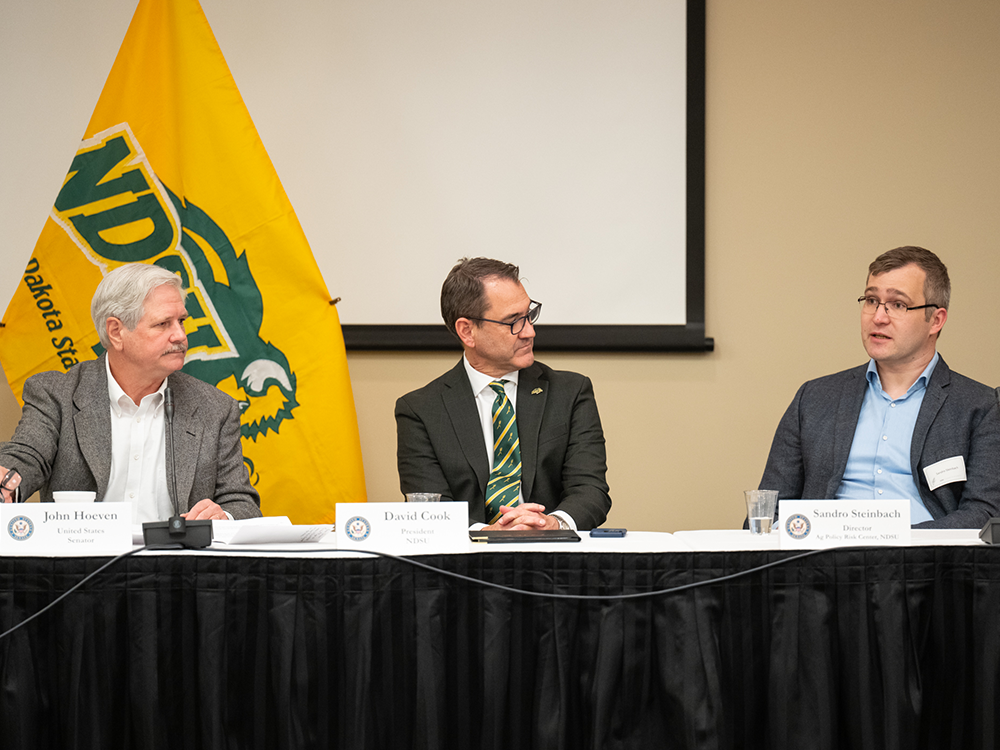Tumultuous commodity prices. High input costs. Too much rain. Not enough rain. Encroaching weeds. Damaging pests. Risk of disease. Equipment breakdowns.
Every single day, Minnesota farmers wake up and “dodge, duck, dip, dive and dodge” a myriad of obstacles threatening to take down their operations. There’s always something, and if growers take their eye off the ball, the repercussions could be catastrophic.
It makes sense that when they’re focused on staying in the black, mustering up the vigor needed to care, let alone take action, about the agriculture policies set in St. Paul and Washington, D.C., can be difficult.
“Farmers know better than anyone how to farm,” said Kevin Leiser, president of the Minnesota Association of Wheat Growers (MAWG). “We don’t want to be at the mercy of the government telling us how to farm.”
Chat with any Minnesota wheat grower and it doesn’t take long to understand the breadth of the time commitment demanded on the farm – not to mention family commitments. Frequent trips to St. Paul and Washington, D.C., whenever policies pertinent to agriculture need to be discussed with legislators is next to impossible. That’s why MAWG membership is a no-brainer.
Since 1975, MAWG has represented Minnesota’s nearly 14,000 wheat growers, funding lobby efforts on issues that improve farmer profits and support educational programs. Spearheading those advocacy efforts in St. Paul, under the guidance of MAWG farmer leaders, is Bruce Kleven, MAWG’s longtime lobbyist.
“It’s been a good job for me because it combines my farm experience with law and policy,” said Kleven, who grew up on a sugarbeet, soybean and corn farm in west-central Minnesota and earned his law degree in 1992. “I help pass good bills and stop bad ones.”
A voice for wheat farmers
Love it or hate it, Minnesota wheat growers should care about ag policy.
“Farmers should care because the policies impact their farms,” said Kleven, who has been MAWG’s lobbyist for 31 years. “Obviously, weather impacts the farm but there’s nothing you can do about that. And although you have a marketing plan to do your best, there’s generally nothing you can do about prices. Ag policy is something you can do something about.”
Without farmer advocacy, crop insurance would be nonexistent. As persistent gamblers, farmers know that when they plant their crop each spring, five minutes – or less – of Mother Nature’s wrath can wipe out their entire crop, sometimes just mere days before harvest.
Established in 1938 to help agriculture recover from the Great Depression and the Dust Bowl, the Federal Crop Insurance Program (FCIP) is a critical tool for producers. From 2000 to 2022, FCIP offered financial and administrative support for 134 unique agricultural commodities, covering an average of 293 million acres annually.
“Minnesota wheat growers – and producers across the country – depend on crop insurance to alleviate a portion of their loss when factors out of their control ruin their crop,” MAWG Executive Director Brian Sorenson said. “That’s why MAWG’s membership in the National Association of Wheat Growers is critical. They are our voice in Washington, D.C., when national policy is being set.”
While ag policy can supplement a grower’s operation when a crisis arises or to encourage environmental practices, ag policy can also strip vital tools from producers. In fact, more often than not, MAWG is playing legislative defense, not offense.
“We have all kinds of threats to our industry in St. Paul from both legislators and agency bureaucrats,” Kleven said.
For example, in 2019, Minnesota’s Groundwater Protection Rule went into effect, which minimizes potential nitrogen fertilizer sources of nitrate pollution to the state’s groundwater and drinking water. The rule restricts the application of nitrogen fertilizer on cropland in the fall or frozen soils in vulnerable groundwater areas, which is defined as an area where nitrate can move easily through soil and into groundwater, contaminating drinking water sources.
However, there are exclusions to the rule, including a climate exemption which applies mainly to counties in northwest Minnesota, the state’s primary wheat growing region. Based on precipitation and evapotranspiration rates and a short planting season, counties in this region have a low nitrate leaching potential. But without hefty lobbying from MAWG and other state commodity groups, this critical exemption would’ve never happened.
“When legislation was trying to pass the nitrogen fertilizer rule, MAWG lobbied to base the rule on science,” said Leiser, who farms near Fertile. “So, northwest Minnesota was exempt from the rule because our soil types aren’t prone to leaching.”
Sometimes, policies detrimental to agriculture come out of left field. Just because a law isn’t categorized as “agricultural” doesn’t mean that it won’t impact producers. A recent example of this scenario is the Paid Family and Medical Leave Law, which published its final rules on June 16 and will go into effect Jan. 1, 2026.
Despite the best efforts of MAWG and other commodity groups, there are no agricultural exemptions to the rule.
“The Minnesota Paid Family and Medical Leave Act, which was passed in 2023, has no farm exemptions – all employers are subject to it,” Kleven said. “Our growers are going to have to pay into that fund. People can use it to take several weeks off from work, like staying home with a new baby. But farm workers generally work on the farm to earn hours and do the work – they don’t sign up with a farmer and then take six weeks off to be home with a newborn. Nevertheless, every farmer in the state who has at least one employee will be paying these added costs regardless of whether his or her employees ever use it.”
At the table, not on the menu
“Teamwork makes the dream work,” isn’t a catchphrase that only applies to sports – it applies to agriculture lobbying, too. MAWG frequently joins forces with other agriculture lobbying groups in the state, presenting a united front. Because of their vigilance, not all proposed legislation sees the light of day, getting shut down before it has the chance to concern producers.
The best offense is a good defense.
“The ag lobby team stops a lot of things that people don’t even know about by talking to legislators and working together,” Kleven said.
When growers stop to think about it, agriculture without lobbying from farm groups lobbying would be unrecognizable – and likely unprofitable.
“I think probably my favorite part is stopping the bad things from happening and burdening our members who are just trying to earn their living,” Kleven said. “Because if you erased the ag lobby team from all the various agriculture groups, we would have a very different looking agriculture state here.”
Farmers know how to farm. For many, it’s what they’ve done their entire life. The elected officials making decisions for farmers don’t know what they don’t know, which is why it’s critical that MAWG is Minnesota wheat producers’ voice at the legislative table.
“Many of the people making these policies don’t even know what corn, soybeans and wheat look like, let alone how they’re grown,” Leiser said. “And then they’re trying to dictate to us that they know better than us how to grow it. Without ag advocacy groups explaining farming to them, we’re just at their mercy.”





